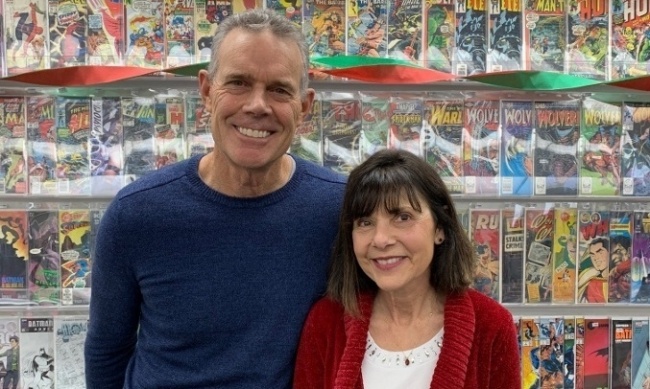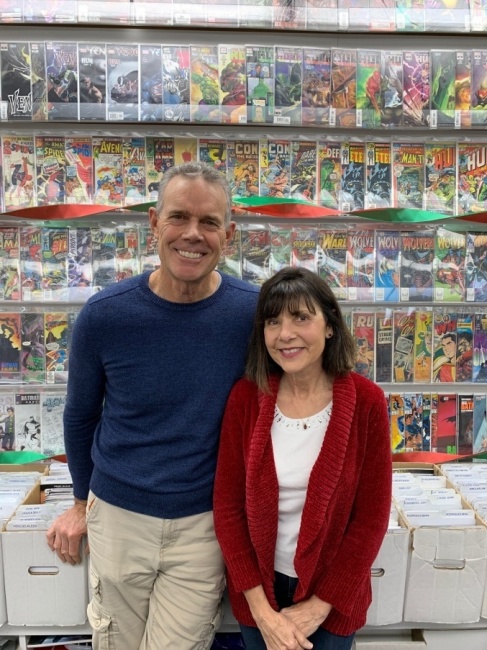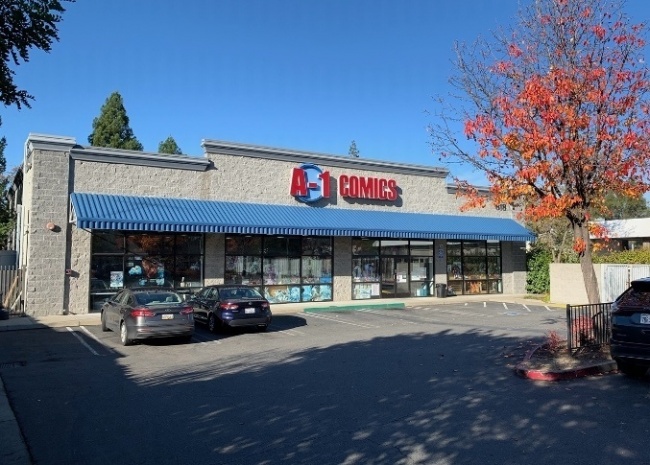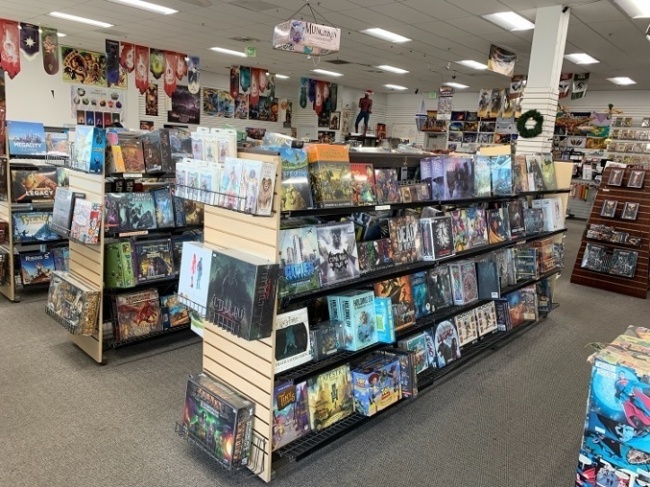In Business 3x3, a business retailer or executive will share their experience with three things they’ve done right, three things they’ve done wrong, and what else they’ve learned along the way.
It’s tough to argue Brian Peets’ work ethic, especially back in 1988 when he founded A-1 Comics in Sacramento.
Peets was working highway construction ("dangerous, dirty, unfulfilling work where you could only earn more by working more hours," he says), but had been a collector since 1968. He supplemented his income by buying and selling comics at conventions and through Comics Buyers Guide. By the time he took the plunge and opened the store, well… the work got harder.
Peets opened a 1000-square foot store 31 years ago and worked it six days a week while his wife, Rosemary worked Sundays. On Brian’s "day off?" He would get up at 1 a.m. on Sunday to travel to Los Angeles for a weekly show. He’d set up by 7, work it ’til 5 p.m., be back home by 1 a.m., grab some sleep and open the store Monday morning at 10 a.m.
A-1 Comics is now a three-store chain, and Peets has learned to work a lot smarter. He’s also getting ready to work a lot less—more on that as you read on. And along his journey, he’s learned a lot more, too…
THE GOOD
RUN YOUR BUSINESS LIKE A BUSINESS
Peets decided right from the jump that his business was going to be 100% above-board.
"Everything I brought into the store was going to be run through the bank," he says. "I’m not going to be one of those guys doing cash deals behind the counter. When I do conventions, I give away the sales tax—I pay that myself, and all the convention money runs through the bank. So all income I have is quantified. A lot of guys don’t understand this, but I was thinking long term: If I wanted to build up a business that had significant value at the end, if and when I was ready to move on, I would have everything to show anybody if I wanted to sell. You can’t just put cash in your pockets and expect anyone else to see that value."
But still… everyone needs cash in their pockets. Peets is on the A-1 payroll, and the bank business has paid dividends as well.
"And every time I go to the bank and need something, we’re able to do it," he says. "I gotta tell you, that’s a pretty good feeling at this point in my retail career. If I want to do something with the bank and couldn’t show my income, I’d be in a world of hurt."
DIVERSIFY!
Peets came from the old-school comic world, but knew that he needed more on his plate.
"When I first started out, I was only interested in old comics, like so many of us older retailers were," he says. "We were going around buying collections and keeping stuff for our collections and selling the leftovers so we could go out and buy more collections."
But his customers wanted more than just comics.
"I was not a gamer, was not into toys," he says. "When I opened the store, I had a gaming rack, which I knew almost nothing about. But I learned how to listen to people and at least have what they were asking for. So as we’ve moved forward, diversification has become greater than ever. We have a lot of eggs in the basket, so even if some of the eggs go bad, some other eggs are good. It gives you a lot of different income streams for your business."
Today, A-1 is doing a booming business in comics both new and old, and running frequent gaming tournaments.
"We’ve organized tournaments with over 100 players, and just four players," he says. "We don’t have limits. If someone wants to use our space and it’s available, we let them."
Diversification of stock is also window dressing—that you can sell.
"Statues don’t sell great, but they’re part of the wow factor when you walk into the store," Peets says. "We do extremely well with Gundam models. In addition to income stream, it creates interest when someone walks in with their significant other. Because there are so many things to look at, you increase your odds of hooking someone when they browse."
BUY YOUR REAL ESTATE
A business is one thing. The ground it’s on is another. Peets recommends you buy both if you can. He owns the real estate two of his three stores are on, including one pretty fun one.
"We ended up buying an old bank building that’s become a great anchor store," he says. "That’s where we do the vintage comics because we have a working bank vault that’s 20x20 feet. So... we have plenty of security for higher-end vintage comics."
And peace of mind goes well beyond just security for Golden Age comics.
"Buying the ground means that I’m in control," Peets says. "If something needs fixing, I don’t need to call somebody and wait on them to fix it. I can fix it now. And I haven’t had a ‘rent increase’ on two buildings for 17 years. That’s kind of nice."
THE BAD
TRUST IS GOOD… UNTIL IT’S NOT
If there’s a lesson here, maybe it’s… browse eBay for your employees’ accounts? Peets has been bitten by employee theft a couple of times with a single root.
"An early employee got addicted to buying stuff on eBay," he remembers. "He started selling stuff at the store, but not running it through the register, and when he closed everything out, he’d have a pile of money there was no record of. One of our other employees caught him. It was extremely disappointing. It was a lot of money over several years, and I got nothing back."
The employee’s wife had cancer at the time, and heath insurance through the store. Despite the thievery, Peets paid the couple’s health insurance premiums for the next six months.
"She’s now cancer free, he never changed his behavior, and they’re no longer married," Peets says.
Peets later bought his second store, that came with an existing manager. Everything went great for the first year, with soaring sales. And then the store flatlined.
"Turns out he and his wife had an eBay business that was going gangbusters because he was stealing all the best stuff from the store, "Peets recalls. "Six months after we fired him, the store doubled its sales. That’s how severe the theft was."
Peets likes to be trusting, and feels he meets everyone halfway, but they have to pick up the other half.
"It’s a small company, and we offer a full line of benefits," he says. "We have sick days, vacation, dental, vision, and health insurance. This is a real job. But some people just coast, and it becomes very obvious. When someone just coasts, that’s a different kind of theft. It takes the effort of everyone pulling in the same direction, and now suddenly everyone else has to work that much harder to make the stores grow."
Bottom line, Peets maintains his trust, but also keeps a wary eye.
"The success of our business for 31 years and in multiple locations, is because the vast majority of employees we have are very, very good," he says.
STORAGE IS A BLACK HOLE
Peets remembers well going to a ComicsPRO meeting where Phil Boyle from Coliseum of Comics was doing a seminar titled "Cutting to the bone without hitting a vein."
"The first thing he asked was ‘How many of you have a storage unit?’ A number of us raised our hands and he said, ‘Get rid of ’em. You’re not going to make any money there,’" Peets relays. "I took that to heart. I took all my stuff out of storage, and loaded it into my garage at home so that only my wife’s car could get in. Now I’m saving money."
Peets knows that in time almost everything will sell. But holding on to it has a cost.
"If I really think about the time going through stuff from this box to that box and all, the additional value over time versus cash flow now I’m sure outweighs whatever I’ve made with stuff in storage," he says.
Bottom line?
"Enough. No more. I have to find a place for this stuff to go, and move on."
DON’T TRY TO DO TOO MUCH
Ah the great entrepreneurial problem—getting out of your own way. Peets thinks he’s finally learned how to do it!
"I have an opinion about everything and a way I like to do everything," he says. "But at some point, you have to delegate work. You have to say, ‘Okay, here’s a bookkeeping company that can do the work better than me and more efficiently than me.’ And I can go back in the store and sell more comics and do something that both makes more money and is more fun."
Peets knows he can’t possibly do everything by himself, so those other people get to pitch in.
"We have nearly 30 employees, and well… if you’re going to hire all those people, make ’em do stuff!" he says. "You have to take all those people you have and let things go some. If I want to take off for two weeks, I can do that and know I have competent people running the stores."
Peets recommends coming to this conclusion sooner rather than later.
"Even if I were a one-man operation, if I could have gone back and done it all over, there are a lot more things I would have outsourced that would have helped me right away," he says.
AND WHAT ELSE?
"When I started, I had more energy than most, and less savings than most. So I relied on energy."
"Energy in a business is really important. The energy of the owner, the energy of employees, and the energy of the business itself. What does it feel like to people who walk through the door? Is there a lot of enthusiasm in the room?"
"Value people. When you’re a retailer, a hobby retailer, you get to know your customers as soon as they walk through the door. You know this guy will spend a lot, and this guy will burn your ear for two hours and spend $1.30. But whenever somebody comes in the door, I don’t see dollar signs. I value everybody for what they bring in. At stores like ours, we’re basically an entertainment venue. This is people’s relaxation time. They’ll come here after work or on their lunch hour. So I value everyone and their time. If they’re taking the time out of their day to see us, hopefully we have something they want, and we present ourselves in a manner that they’ll purchase something. That’s awesome."
"All the people I have, I value them. "I have a general manager, Ruth Sparks, and her enthusiasm…she’s a real dynamo. "Competent, knowledgeable, and she brings perspective to the table that I don’t have. "We’ve made a really good team. She’ll be the one running things moving forward."
"We own two of the three properties, brick-and-mortar, the mortgages are almost paid off, so in two more years, it’ll be that much easier for us because I won’t have that nut. And it’s set the company up in a good place going forward for the people who will take it over next year and run it full time as I drop back to part time."
"I bought other stores when they were ready to go out of business. One became my second store. We built and built and built on, and eventually bought a property, built the building, and we now have space in the building we lease out which provides some nice supplemental income, but all because I was able to get a bank loan because I was running my business like a business."
"I was looking at buying another business and asked the guy to give me three months’ bank statements. In just those three months, there were charges from Marie Callander’s, Big O Tires, a cell phone bill, a utility bill not in the same address as his store, Sam’s Club, a haircut, and more. This guy was mixing all his personal expenses with his business expenses. It was impossible to separate out what his business was worth without spending weeks combing through the statements. I went back and told the guy, ‘This is ridiculous. I have no idea how much business you’re doing.’ I couldn’t tell by looking at his statements. A couple years later, he’s still trying to sell that store."
"It does happen. Sometimes I’ve pulled the wrong credit card and paid for a personal expense with a business credit card. But every two weeks when we get paid, that gets subtracted out of my check."
"We have close to 30 employees. It’s more than just me and my family. I have all these people counting on me and the business. If I’m running willy-nilly… there’s more at stake than me."
"In sports terminology, I have a big motor. I can do a lot of stuff in a day. If I have to work 17 hours a day, I’ll do it, and do it as long as I have to get to where I want to be. But you need to put your energy in the right places. When I started the business, I did everything—ordering, check-in, stocking, balancing the checkbook, when I got employees, I became the human resources guy."
"Now we have an in-house bookkeeper. She comes in here four days a week, works her tail off. Always happy, always energetic, always ready to go to work."
"Embrace change. Things are going to change all the time. I used to print off Diamond order forms, fill ’em out, and fax ’em back in. Now it’s all on the computer and we zip it off and that’s better. Part of me being the old guy in the room… I know what’s tried and true and what will work. But I also know the change will come regardless, so embrace it."
"I don’t talk about that much. But I had four years in the NFL, so I’m vested. That is kind of nice. I don’t talk about it much because number one, I wasn’t very good. And number two, I told myself when I opened the store, it was gong to be about comics and the business. Now most people love to talk about sports, and I usually do, too. But I didn’t want to spend all my time behind the counter talking about sports, the fact that I used to be a player, whatever. I think we’ve all been in a store where you’re waiting in line or trying to get service, and that guy at the counter is telling stories or chatting about whatever, and I don’t ever want to be that guy or have that kind of store. It’s not something I ever really wanted to talk about at my business."
Click Gallery below for store pics!

A Comics and Games Retailer with Three Stores Shares His Lessons
Posted by Jim McLauchlin on December 17, 2019 @ 11:04 am CT






 View Gallery: 11 Images
View Gallery: 11 Images